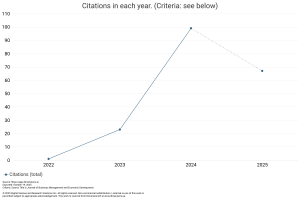Integration of CSR and travelers’ ascription of responsibility toward electric ride-hailing continuous intention in Vietnam
DOI:
https://doi.org/10.59653/jbmed.v3i03.1810Keywords:
electric ride-hailing, corporate social responsibility, ascription of responsibility, continuous intention, travel behaviorAbstract
In response to growing environmental concerns and the increasing emphasis on sustainable tourism, this study investigates the influence of corporate social responsibility (CSR), including environmental CSR and customer-related CSR, and travelers’ ascription of responsibility (AOR) on their continuous intention to use electric ride-hailing services while traveling in an emerging economy, Vietnam. The study employed a quantitative method using a questionnaire survey and data were collected through non-probability sampling methods. The results demonstrated that all three factors positively influenced travelers' continuous intention, with AOR exhibiting the most vital role. On top of that, customer-related CSR has a slightly higher impact on travelers' continuous intention compared with environmental CSR. The study contributes to understanding sustainable behavior in the context of tourism mobility and offers insights for promoting green transportation models. The findings also highlight the need for combined efforts from both service providers and travelers, suggesting strategies that integrate individual awareness, customer-oriented CSR actions, and environmental commitment.
Downloads
References
Akbari, M., Nazarian, A., Foroudi, P., Seyyed Amiri, N., & Ezatabadipoor, E. (2020). How corporate social responsibility contributes to strengthening brand loyalty, hotel positioning and intention to revisit? Current Issues in Tourism, 24(13), 1897–1917. https://doi.org/10.1080/13683500.2020.1800601
Aktan, M., Zaman, U., Raza, S. H., & Koc, E. (2024). Demystifying tourists’ intentional readiness for net zero transformation through environmental knowledge, conspicuous altruism, and greenwashing perceptions. Asia Pacific Journal of Tourism Research, 29(4), 495–514. https://doi.org/10.1080/10941665.2024.2333497
Al-Emran, M., Arpaci, I., & Salloum, S. A. (2020). An empirical examination of continuous intention to use m-learning: An integrated model. Education and Information Technologies, 25(4), 2899-2918. https://doi.org/10.1007/s10639-019-10094-2
Asian Transport Outlook (ATO). (2024). Transport and Climate Profile: Viet Nam [Report]. Retrieved from https://asiantransportobservatory.org/analytical-outputs/countryprofiles/profile-viet-nam/
Boar, A., Bastida, R., & Marimon, F. (2023). Sustainable development goals and quality practices: a winning combination for customer loyalty in ride-hailing companies. Transportation Letters, 15(9), 1230–1241. https://doi.org/10.1080/19427867.2023.2233213
Carroll, A. B. (1991). The pyramid of corporate social responsibility: Toward the moral management of organizational stakeholders. Business Horizons, 34(4), 39-48. https://doi.org/10.1016/0007-6813(91)90005-G
Danang FantastiCity. (2025, April 9). Xanh SM – A green revolution in transportation. Retrieved from https://danangfantasticity.com/news/xanh-sm-a-green-revolution-in-transportation
Duong, C. D. (2025). Balancing awareness and responsibility: Cognitive mechanisms shaping electric vehicle purchase intentions. Transportation Research Interdisciplinary Perspectives, 31, 101440. https://doi.org/10.1016/j.trip.2025.101440
European Commission. (2020). Corporate social responsibility & responsible business conduct. Retrieved from https://ec.europa.eu/growth/industry/corporatesocial-responsibility_en
Gössling, S. (2020). Integrating e-scooters in urban transportation: Problems, policies, and the prospect of system change. Transportation Research Part D: Transport and Environment, 79, 102230. https://doi.org/10.1016/j.trd.2020.102230
Hair, J. F., Risher, J. J., Sarstedt, M., & Ringle, C. M. (2019). When to use and how to report the results of PLS-SEM. European business review, 31(1), 2-24. https://doi.org/10.1108/EBR-11-2018-0203
Hameed, F., Qayyum, A., & Awan, Y. (2018). Impact of dimensions of CSR on purchase intention with mediating role of customer satisfaction, commitment and trust. Pakistan Business Review, 20(1), 13-30.
Han, H. (2014). The norm activation model and theory-broadening: Individuals’ decision-making on environmentally-responsible convention attendance. Journal of Environmental Psychology, 40, 462-471. https://doi.org/10.1016/j.jenvp.2014.10.006
He, X., & Zhan, W. (2018). How to activate moral norm to adopt electric vehicles in China? An empirical study based on extended norm activation theory. Journal of Cleaner Production, 172, 3546-3556. https://doi.org/10.1016/j.jclepro.2017.05.088
Hourdequin, M. (2011). Climate change and individual responsibility: a reply to Johnson. Environmental Values, 20(2), 157-162. https://doi.org/10.3197/096327111X12997574391643
Intergovernmental Panel on Climate Change (IPCC). (2023). Climate Change 2023: AR6 Synthesis Report. Retrieved from https://www.ipcc.ch/report/ar6/syr/
Jakučionytė-Skodienė, M., & Liobikienė, G. (2021). Climate change concern, personal responsibility and actions related to climate change mitigation in EU countries: Cross-cultural analysis. Journal of Cleaner Production, 281, 125189. https://doi.org/10.1016/j.jclepro.2020.125189
Jeon, M. M., Lee, S., & Jeong, M. (2020). Perceived corporate social responsibility and customers’ behaviors in the ridesharing service industry. International Journal of Hospitality Management, 84, 102341. https://doi.org/10.1016/j.ijhm.2019.102341
Kock, N. (2015). Common method bias in PLS-SEM: A full collinearity assessment approach. International Journal of e-Collaboration, 11(4), 1-10. https://doi.org/10.4018/ijec.2015100101
Madanaguli, A., Srivastava, S., Ferraris, A., & Dhir, A. (2022). Corporate social responsibility and sustainability in the tourism sector: A systematic literature review and future outlook. Sustainable Development, 30(3), 447-461. https://doi.org/10.1002/sd.2258
Nguyen, G. K. (2025, February 19). ‘Airpocalypse’ Now: Vietnam at Crossroads of Progress and Pollution. Fulcrum. Retrieved from https://fulcrum.sg/airpocalypse-now-vietnam-at-crossroads-of-progress-and-pollution/
Pérez, A., & del Bosque, I. R. (2015). The formation of customer CSR perceptions in the banking sector: The role of coherence, altruism, expertise and trustworthiness. International Journal of Business and Society, 16(1), 75-94. https://doi.org/10.33736/ijbs.555.2015
Rahman, M. M. (2023). Sample size determination for survey research and non-probability sampling techniques: A review and set of recommendations. Journal of Entrepreneurship, Business and Economics, 11(1), 42-62. Retrieved from https://www.scientificia.com/index.php/JEBE/article/view/201
Raza, S. A., Khan, K. A., & Qamar, B. (2024). Understanding the influence of environmental triggers on tourists’ pro-environmental behaviors in the Pakistan’s tourism industry. Journal of Tourism Futures, 10(1), 38-67. https://doi.org/10.1108/JTF-12-2021-0269
Ritchie, H. (2020, October 6). Cars, planes, trains: where do CO₂ emissions from transport come from?. Our World in Data. Retrieved from https://ourworldindata.org/co2-emissions-from-transport
Roxas, F. M. Y., Rivera, J. P. R., & Gutierrez, E. L. M. (2020). Mapping stakeholders’ roles in governing sustainable tourism destinations. Journal of Hospitality and Tourism Management, 45, 387-398. https://doi.org/10.1016/j.jhtm.2020.09.005
Rupp, D. E., & Mallory, D. B. (2015). Corporate social responsibility: Psychological, person-centric, and progressing. Annual Review of Organizational Psychology and Organizational Behavior, 2(1), 211-236. https://doi.org/10.1146/annurev-orgpsych-032414-111505
Schwartz, S. H. (1977). Normative Influences on Altruism. Advances in Experimental Social Psychology, 10, 221-279. https://doi.org/https://doi.org/10.1016/S0065-2601(08)60358-5
Shah, K. J., Pan, S. Y., Lee, I., Kim, H., You, Z., Zheng, J. M., & Chiang, P. C. (2021). Green transportation for sustainability: Review of current barriers, strategies, and innovative technologies. Journal of Cleaner Production, 326, 129392. https://doi.org/10.1016/j.jclepro.2021.129392
Van Fan, Y., Perry, S., Klemeš, J. J., & Lee, C. T. (2018). A review on air emissions assessment: Transportation. Journal of Cleaner Production, 194, 673-684. https://doi.org/10.1016/j.jclepro.2018.05.151
Van Huy, L., Nguyen, H. T., Hoang Long, P., Quyen Phu Thi, P., & Pham, N. T. (2024). Going green: predicting tourists’ intentions to stay at eco-friendly hotels–the roles of green attitude and environmental concern. Journal of Hospitality and Tourism Insights, 7(5), 2723-2741. https://doi.org/10.1108/JHTI-05-2023-0355
Vu, K. (2022, November 24). Air pollution: 70% due to traffic. Economic and Urban Newspaper. Retrieved from https://kinhtedothi.vn/o-nhiem-khong-khi-70-do-phuong-tien-giao-thong.html (in Vietnamese).
Wut, T. M., Xu, B., & Wong, H. S. M. (2021). A 15-year Review of “Corporate Social Responsibility Practices” Research in the Hospitality and Tourism Industry. Journal of Quality Assurance in Hospitality & Tourism, 23(1), 240–274. https://doi.org/10.1080/1528008X.2020.1864566
Yin, C., Ma, H., Gong, Y., Chen, Q., & Zhang, Y. (2021). Environmental CSR and environmental citizenship behavior: The role of employees’ environmental passion and empathy. Journal of Cleaner Production, 320, 128751. https://doi.org/10.1016/j.jclepro.2021.128751
Downloads
Published
How to Cite
Issue
Section
License
Copyright (c) 2025 Loi Duc Nguyen, Truong Pham-Hong

This work is licensed under a Creative Commons Attribution-ShareAlike 4.0 International License.
Authors who publish with this journal agree to the following terms:
- Authors retain copyright and grant the journal right of first publication with the work simultaneously licensed under a Creative Commons Attribution-ShareAlike that allows others to share the work with an acknowledgement of the work's authorship and initial publication in this journal.
- Authors are able to enter into separate, additional contractual arrangements for the non-exclusive distribution of the journal's published version of the work (e.g., post it to an institutional repository or publish it in a book), with an acknowledgement of its initial publication in this journal.
- Authors are permitted and encouraged to post their work online (e.g., in institutional repositories or on their website) prior to and during the submission process, as it can lead to productive exchanges, as well as earlier and greater citation of published work (See The Effect of Open Access).





























